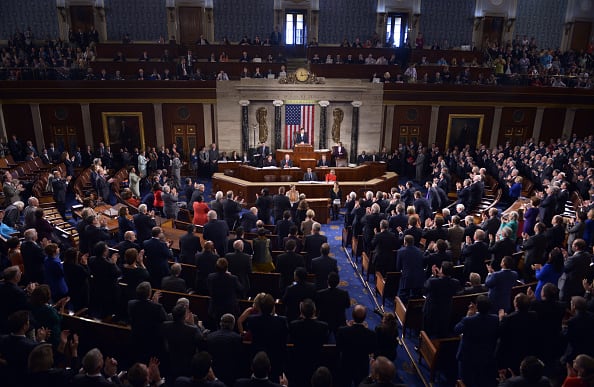Originally published Nov. 22
WASHINGTON — Following the Islamic State group's terrorist attacks on Paris, Sen. John McCain on Nov. 19 called for the Pentagon and other other national security agencies to be exempted from the Budget Control Act caps.
signals
Immediately before an impassioned speech on the Senate floor, McCain said as much to reporters — that defense should be increased "in spite of the deal." The bipartisan budget agreement, which leaves the caps in place through 2021, allows the Pentagon to spend $606.8 billion in 2016 and $609.8 billion in 2017, including $8 billion in Ooverseas Ccontingency Ooperations (OCO) each year.
"I told them at the time, I'm glad at what we did for 2016, but I disagree with 2017," said McCain, R-Ariz. "I didn't cut that deal."
A more politically palatable increase for defense is brewing in the lower chamber. Rep. Mac Thornberry, the House Armed Services Committee chairman, told reporters on Nov. 17 that the wartime contingency account, OCO — which is separate from the top-line — may need to be augmented. Thornberry is among committee chairmen assembled by House leadership to find ways for Congress to help in the fight against the Islamic State group.
"I do believe that greater resources are going to be needed to be serious about ISIL," said Thornberry, R-Texas.
In a much more blustery move, McCain took to the Senate floor to ask the Senate for unanimous consent for legislation exempting the Defense Department, the Department of Homeland Security, the intelligence community, the State Department and the National Nuclear Security Administration from spending caps, known as sequestration.
"What we must also acknowledge is that, while the threat posed by [the Islamic State] and our other adversaries is growing, our national security budgets are increasingly disconnected from our national security requirements," McCain said, adding: "To continue on this way especially after Paris is not only absurd, it is dangerous."
McCain argued that while the U.S. US is ramping up responses to escalating national security challenges from the Islamic State, Russia and China, the defense budget is falling from 2016 to 2017, when adjusted for inflation. The military is being asked to do more, he said, at "arbitrary and insufficient budget levels, revised periodically with whatever additional resources the Congress is able to scare up."
On Nov. 19, Sen. Jack Reed, SASC's ranking member, blocked McCain's request with "great reluctance." Reed argued that federal agencies not named by the bill contribute to national security, and that the best course would be to repeal the 2011 Budget Control Act altogether.
The Budget Control Act was originally intended to force a grand bargain between Democrats and Republicans, but it hasn't, "so we're left with the forcing device without the deal," Reed, D-R.I., told Defense News.
While McCain is highly influential, for Republican leadership — let alone Democrats — it would be tough to get them to tug at the strands of the hard-won bipartisan budget agreement. A key stipulation for Democrats was the relaxation of budget caps for defense and non-defense in equal measure, and in a gambit to include that tenet, President Obama vetoed the 2016 defense policy bill.
Passage of McCain's measure would cost Democrats their valuable hostage in any budget negotiations. When Republicans sought to pass a defense appropriations bill as the first in the series of appropriations measures after the deal, Democrats voiced fears Republicans would pass the bill and break the deal — which led Republicans to backtrack.
While neither McCain nor Thornberry control appropriations, two powerful appropriators did not dismiss a near-term increase of some sort for defense spending. Senate Appropriations Committee Chairman Sen. Thad Cochran, R-Miss., told Defense News: "Anything is possible."
The top Democrat on the Senate Appropriations Committee, Barbara Mikulski, of Maryland, said it was premature to discuss an increase for wartime funding, but suggested the White House could request it.
"We are waiting for the administration to see if they need more money and where they will need money," Mikulski told Defense News.
Speaking to Defense News at last weekend's Halifax International Security Forum in Canada, Sen. Tim Kaine, D-Va., said Congress was unlikely to revisit military funding levels now that a two-year budget deal has been struck. But appropriators could tweak funding priorities if they want to make some post-Paris adjustments, he said.
In the immediate aftermath of the Paris attacks, one area that lawmakers may examine is whether refugee vetting or tourist visas or other programs that allow foreigners to enter the US should be tweaked, said Kaine, a member of the Senate Armed Services Committee.
"The fact that some of the Paris attackers, knowing who they are they could have come in through the visa waiver program, we may look at that a little more carefully," he said.
One bill that seeks to reduce the flow of refugees into the US, the Safety Against Foreign Enemies (SAFE) Act, has passed the House of Representatives. But Senate is unlikely to approve the SAFE Act, which the White House has threatened to veto, without changes, Kaine said.
One thing that needs changing is the name, he said.
"The notion that Syrian and Iraqi refugees are 'foreign enemies?' No, ISIL's the enemy. We won't even have a vote on the war against ISIL, the real enemy, but we're going vote against refugees and call them enemies?" Kaine said.
One prominent defense industry lobbyist said discussions in Congress favoring a modest increase in the OCO account have been ongoing since before the Paris attacks, but dismissed McCain's proposed legislation and a deal-busting top-line increase as, "leprechauns and unicorns."
"There's no way they're going to upset the apple cart," the lobbyist said.
In his briefing with reporters, Thornberry said the OCO amount established by the pact was "clearly a floor," and that "OCO next year will at least be as large as the OCO this year, understanding you've got to see what the world is like.
"We've got to be responsive to the world, and it would be irresponsible not to be," Thornberry said.
In a fight over the top-line, McCain will have allies among "most of the Republicans" on the SASC, said SASC member, Sen. Jim Inhofe, R-Okla. Defense has under the Obama administration experienced a "shameful" decimation, said Inhofe, "and we have to do everything we can to try to correct it, and it's not easy because we need to get a handful of Democrats to agree."
A top aide to HASC House Armed Services Committee member Rep. Duncan Hunter, R-Calif., said the legislation represented McCain "doing everything in his ability" to see that national security be given greater consideration than the rest of the budget. The bill is a "mark on the wall," that would allow Republicans to at least gauge which opponents to greater defense spending may have changed their minds, given recent events, said the aide, Joe Kasper.
"Everything's incremental," Kasper said of the proposed legislation's relationship to the budget deal. "You take a deal up front to get a better deal down the road. There are a lot of ways to get to yes."
Earlier in the week, a top McCain aide, Christian Brose, said at a national security forum that he anticipated a fight in Congress over the defense top-line in 2017 this spring. Presidential candidates of both parties, saying they favor a more robust defense, could potentially create the space for the fight in Congress.
Seated next to Brose at the forum, former Undersecretary of Defense (Comptroller) Tina Jonas, acknowledged the national security picture could fuel arguments to raise the defense top-line, but concluded "there are many voices that will say 'stick to the deal.'"
"It's going to be a political year, things will be exciting," she said, "but my prediction is that we will come up somewhere near the budget deal, with maybe a little fudging here or there."
Andrew Clevenger contributed to this report from Halifax.
Email: jgould@defensenews.com.
Twitter: @reporterjoe
Joe Gould was the senior Pentagon reporter for Defense News, covering the intersection of national security policy, politics and the defense industry. He had previously served as Congress reporter.








